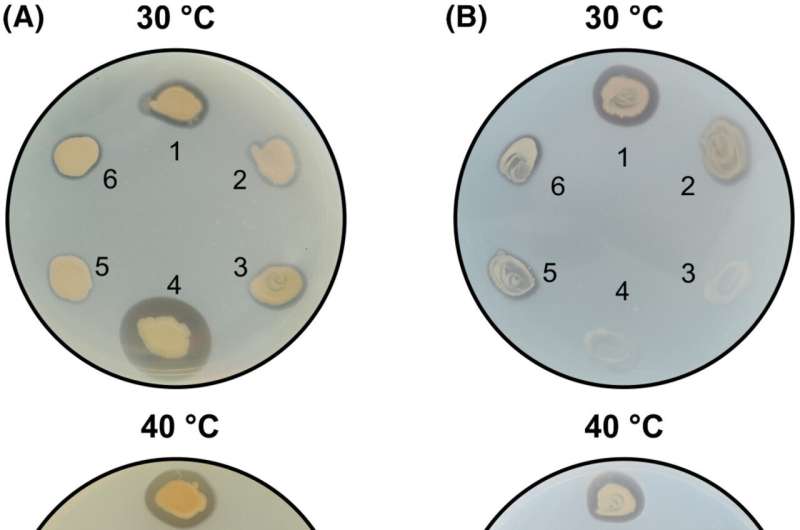This article has been reviewed according to Science X's editorial process and policies. Editors have highlighted the following attributes while ensuring the content's credibility:
fact-checked
trusted source
proofread
Insights into the metabolism of plastic-eating bacteria

Plastic-eating bacteria could help to curb the global waste problem in the future. But many questions remain unanswered. Researchers at Forschungszentrum Jülich and Heinrich Heine University Düsseldorf have now shown for the first time how bacteria of the genus Halopseudomonas break down common plastic coatings made of polyester urethane. The metabolic pathways and enzymes described underline the relevance of the newly isolated bacterium for the biodegradation of plastics and pave the way for its application.
Plastic materials are indispensable in everyday life. But if they are left lying around, they become a problem. As they do not decompose, they accumulate in the environment, a process that has already led to global pollution. Only recently, a promising candidate was discovered—bacteria of the genus Halopseudomonas.
Researchers at Forschungszentrum Jülich and Heinrich Heine University Düsseldorf have now taken a closer look at these bacteria. The results have been published in two joint articles in the journal Microbial Biotechnology.
Halopseudomonas bacteria live in the deep sea in places that are polluted with crude oil or heavy metals. However, they have also been found in compost heaps. Researchers from Jülich and Düsseldorf have now discovered that the bacteria have a particular appetite for so-called polyester polyurethanes. This type of plastic is used to coat textiles, ropes and fishing nets, among other things, which improves their durability but at the same time makes it more difficult to break down or recycle these plastic materials.
One promising solution of this problem lies with the bacterium Halopseudomonas formosensis FZJ, which was isolated from a compost heap. The bacteria can rapidly biodegrade polyester urethane coatings and is particularly tolerant of the high temperatures that typically occur in compost.
Researchers led by Prof. Nick Wierckx from the Institute of Bio- and Geosciences (IBG-1) at Forschungszentrum Jülich have succeeded in elucidating the metabolic pathways underlying this process. In the first paper, by Jan de Witt and colleagues, they also describe an enzyme involved in the coating degradation.
Pathways to biotechnological application
Researchers at the Institute for Molecular Enzyme Technology at HHU Düsseldorf led by Prof. Karl-Erich Jaeger have investigated further steps toward practical implementation. In the second paper, by Luzie Kruse and colleagues, the team further unlocks Halopseudomonas bacteria for biotechnology applications by developing appropriate cultivation strategies and molecular biological methods allowing for genetic modification of these bacteria. It is also shown that these bacteria can utilize dicarboxylic acids, which are components of many plastics.
"These two publications provide detailed insights into the microbial degradation of plastics and underlines the importance of the newly isolated bacterium for future processes enabling plastic biodegradation and bio-upcycling," Nick Wierckx and Karl-Erich Jaeger agree.
More information: Jan de Witt et al, Biodegradation of poly(ester‐urethane) coatings by Halopseudomonas formosensis, Microbial Biotechnology (2023). DOI: 10.1111/1751-7915.14362
Luzie Kruse et al, Halopseudomonas species: Cultivation and molecular genetic tools, Microbial Biotechnology (2023). DOI: 10.1111/1751-7915.14369
Provided by Forschungszentrum Juelich





















